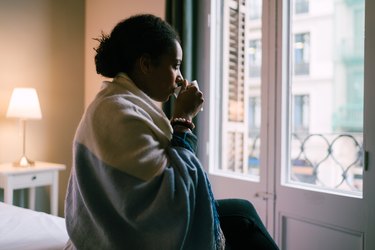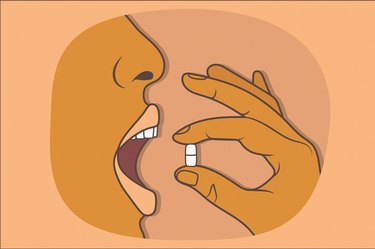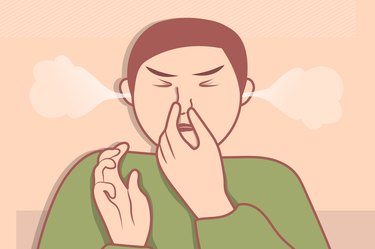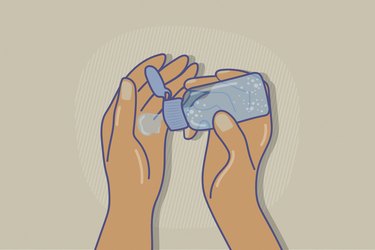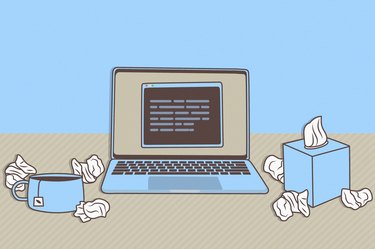
Working remotely has its perks: You can avoid a crappy commute, wear pajama pants during meetings and sneak in a workout during your lunch hour. But when the line between your home and the office becomes blurred, there are also some possible downsides too.
Perhaps the most damaging drawback: Many people with remote jobs feel the pressure to perform around the clock, even if they aren't feeling well.
Video of the Day
In fact, 66 percent of Americans who work from home report that their bosses would disapprove of taking a sick day for any ailment less serious than COVID-19, according to a 2020 poll commissioned by ColdCalm, a cold medicine company.
And this stress to impress employers has clearly affected employees' decisions when it comes to sick days. The same survey also found that 67 percent of respondents were less likely to skip a day of work when sick, while seven in 10 have already pushed themselves to power through the workday when ill.
But what are the repercussions of toughing out a terrible cold or fighting the flu while working remotely?
Here, medical experts explore how working from home when you're sick can sabotage your health (now and in the future) and prevent you from being productive on the job too.
4 Risks of Working From Home When You're Sick
1. It Doesn’t Allow You the Rest You Need to Recover
"When our bodies are sick, they are spending a lot of energy fighting off the infection and trying to recover," says Laura Purdy, MD, MBA, a board-certified family medicine physician.
But if you choose to work from home, you deprive your body of the rest it needs to repair, Dr. Purdy says.
Indeed, sleep is a pivotal part of the healing process. Here's why: When you snooze, your immune system produces protective proteins called cytokines (which help fight infection and inflammation) as well as antibodies, according to the Mayo Clinic.
So if you're skimping on essential slumber to slog through a meeting, you're essentially decreasing your immune system's defenses and possibly extending the length of your illness.
2. It Can Be Stressful
"If you're trying to keep up with your workload, but you're not as clear thinking or energetic as usual," the normal demands of your daily routine can feel especially stressful, Dr. Purdy says.
And adding more stress to the mix — which can cause inflammation in the body — is not ideal when you have an impaired immune system that's already struggling to fend off an infection.
Put another way: Pushing yourself when you're ill can disrupt your bioenergetic state and place your body in a stress state, says Kien Vuu, MD, host of The Thrive State Podcast.
If you're too stressed, your cells won't function optimally, and your immune system will be less able to counteract a foreign invader such as a virus or bacteria, Dr. Vuu says.
3. You Won’t Perform at Your Best
Real talk: No one does their best work when they're under the weather.
"When you're sick, especially, if you have a severe illness, it can be hard to concentrate and focus on the task at hand," Dr. Purdy says. Not only will your productivity likely decline but the quality of your work will take a hit too, she says.
Dr. Vuu agrees: Powering though the workday if you feel poorly can prevent peak performance. "There's a point in time when there are diminishing returns," he says. When you're feeling frail and fatigued, you can't cognitively perform at your best or activate your flow state. And this is when you tend to make mistakes, he adds.
Case in point: more than half of people reported their work performance suffered "considerably" when they worked from home while sick, according to the same ColdCalm poll.
4. You Can Burn Out in the Long Run
When you work remotely, there's often no clear distinction between your office space and your home. And this can make it hard to maintain a healthy work-life balance, especially for high performers and overachievers, Dr. Purdy says.
Which is why it can be all too tempting for people to tough it out from home even when they feel terrible. But making this a habit can be harmful.
"Over time, if there are poor boundaries and little separation between your work life and home life, it can lead to burnout and disengagement," Dr. Purdy says. And this ultimately results in decreased quality of output, she adds.
Dr. Vuu agrees that a good balance is necessary not only for better productivity in the long term but also to optimize health and achieve a thrive state.
When our body is in homeostasis, our cells are functioning at their best and can more effectively manage outside threats such as viruses or bacteria, he says.
But if you have a mentality like, I'll sleep when this project is over or I'll just relax on my annual vacation, you're overstressing your body, which won't have the right amount of energy for health and healing.
And not allowing your body to recover and repair when you're run-down can increase your risk of feeling sick in the future.
That's what a June 2009 study in the Journal of Epidemiology and Community Health concluded. People who repeatedly went to work ill (more than six times in a year) had a 74 percent greater chance of having a long-term absence (for two months or more) due to sickness down the road.
In the long run, pushing your body like this can lead to chronic inflammation and disease, Dr. Vuu says.
It's true. Research demonstrates that chronic inflammation can contribute to the development of serious illness such as heart disease, diabetes, cancer, arthritis and bowel diseases like Crohn's disease and ulcerative colitis, according to Harvard Health Publishing.
What's more, this type of burnout not only affects you physically but also mentally. A June 2014 study in the Journal of Occupational and Environmental Medicine found that working while sick may significantly increase your risk for depression.
Signs You’re Too Sick to Work From Home
"If you listen to your body, you will know whether it is safe or healthy for you to try to work through an illness," Dr. Purdy says.
In other words, don't ignore your body's signals, which can help you know when it's time to call it quits and take a proper sick day.
"I would definitely recommend avoiding work if you are severely sleep deprived, or have a very high fever, extreme fatigue, nausea or vomiting," Dr. Purdy says.
Similarly, severe body aches, lack of appetite and hounding headaches may also indicate that it's time to close shop and shut down your computer, Dr. Vuu says.
In these cases, focus on getting plenty of rest, hydrating frequently with fluids and, if possible, eating nutrient-dense, anti-inflammatory foods, he says.
Is It Ever OK to Work From Home When You’re Sick?
"This is something that every person must decide for themselves," Dr. Purdy says. "Sometimes I still work from home if I am slightly under the weather, but only if I am feeling up to it. If I have a fever, I am so sick that I slept poorly the night before or I am really struggling, I will take the day off."
Dr. Vuu agrees that the decision also depends on how ill you are. For example, if your symptoms are mild — say, you have a runny nose but otherwise you still have an appetite, and your energy is good — you could still do most of your work from home, he says.
The type of work you do — how physically, mentally or emotionally demanding it is — should also factor into your decision, he says. Again, you want to avoid adding more stress to your life when you're sick.
"Another alternative is to designate yourself as 'out of office' but work on some projects individually if you feel that you have the energy to do so," Dr. Purdy adds. This way, you can work at your own pace and stop whenever you're feeling too unwell.
So, How Bad Is It Really to Work From Home When You’re Sick?
If you have a mild case of the sniffles, you're probably in the clear to continue working from home. But forcing yourself to perform when you're unfit to work is futile both for your productivity and your health.
By giving yourself the time you need to rest when you're sick, you'll have a speedier recovery and, ultimately, it will allow you to have better output at work, Dr. Purdy says.
Dr. Vuu agrees we should put more focus on recovery and taking care of ourselves. This will enable you to show up and do your best at work and at home with your family and relationships, he says.
The bottom line: "There's no shame in taking a day off for illness," Dr. Purdy says.
- Mayo Clinic: “Lack of sleep: Can it make you sick?”
- Journal of Epidemiology and Community Health: “Sick at Work — A Risk Factor for Long-Term Sickness Absence at Later Date”
- Harvard Health Publishing: “Understanding acute and chronic inflammation”
- Journal of Occupational and Environmental Medicine: “Is sickness presenteeism a risk factor for depression? A Danish 2-year follow-up study”
Is this an emergency? If you are experiencing serious medical symptoms, please see the National Library of Medicine’s list of signs you need emergency medical attention or call 911.


